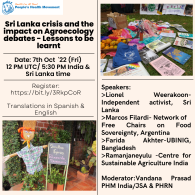The Sri Lanka crisis has made movements and activists discuss and reflect on the best ways to transition to agroecology.
After the economic crisis in Sri Lanka this year and the preceding ban on chemical fertilisers, the debate around agro-ecology has come to the fore once again. The Sri Lanka crisis has made movements and activists discuss and reflect on the best ways to transition to agroecology. There have also been observations from some countries on how the crisis and the links with the fertiliser ban is being used by agro-businesses to create an adverse discourse around agro-ecology, possibly weakening the agro-ecology movement.
The Food and Nutrition thematic group of People’s Health Movement consulted with colleagues from PHM Sri Lanka who agreed on the need to ‘clear the air’ in terms of the exact turn of events in the country, on what led to the national crisis and in what way (if any) is it linked to the fertiliser ban. This is an important opportunity for PHM as well as movements working on agroecology and food security to learn from friends in Sri Lanka and listen to voices from different countries on how the debate around organics and agroecology is being played out in their respective countries after the Sri Lanka crisis. In this context we are organising a webinar discussion with the following objectives-
- To understand from friends from Sri Lanka as to what happened during the Sri Lankan crisis and in what ways (if any) it links with the fertilizer ban in the country
- Sharing from friends in different countries (Argentina, Bangladesh, India) on the impact of the Sri Lankan crisis on the debates on agroecology in their respective countries.
- To promote dialogue and learn from Sri Lanka in order to better create roadmaps for the transition to ecologically sustainable agriculture.
- Moderator: Dr. Vandana Prasad (PHM India/JSA and Public Health Resource Network)
- Dr. Lionel Weerakoon- Independent Activist, Sri Lanka
- Marcos Ezequiel Filardi (lawyer), Member of the Network of Free Chairs on Food Sovereignty (Red Calisas), Argentina
- Farida Akhter, Unnayan Bikalper Nitinirdharoni Gobeshona (UBINIG), the Policy Research for Development Alternatives, Bangladesh
- Dr. Ramanjaneyulu (Ramoo), Centre for Sustainable Agriculture, India


No comments:
Post a Comment